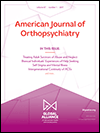IBCCES is the global leader in training and certification for healthcare professionals, educators and corporate partners who work with individuals with autism and other cognitive disorders. Our reach extends to more than 2 million people in all 50 states and over 70 countries around the globe. IBCCES Member Learning Community is provided as a free service to all IBCCES members who have completed one or more of our training and certification programs.
Latent class analysis of COVID-19 experiences, social distancing, and mental health.
 This post was originally published on this site
This post was originally published on this siteInformation is needed on the relationship between coronavirus disease (COVID-19) social distancing restrictions and their relationship with mental health. In particular, there is limited investigation into how COVID-related adversities have positively mobilized individuals. We use latent class analysis (LCA) to identify subtypes of positive and negative aspects of the experience of COVID-19 social distancing and the association of these subtypes with mental health. We conduct an online survey of COVID-19 and mental health with 3,183 adults residing in Quebec, Canada, during the first wave of the epidemic. We use LCA to identify subtypes of positive and negative aspects of social distancing. We use logistic and linear regression to estimate the associations between class membership and self-reported impact of COVID-19 on mental health and scores on the Hopkins Symptom Checklist-10 (HSCL-10). We identify five classes of individuals in regards to perceived positives and negatives of social distancing related to COVID-19, named Low Impact, Freedom/Flexibility, Safety, Family/Home, and Hardships. Sociodemographic variables including age, gender, race/ethnicity, and self-reported mental health prior to COVID are associated with class assignment. Latent classes are associated with both outcomes (p < .001). Individuals in the Hardships class have greater odds of reporting a significant impact of COVID-19 on mental health, OR = 2.09, 95% CI = [1.53, 2.86], p < .001, and have higher scores on the HSCL-10, β = .32, 95% CI = [.23, .42], p < .001, than those individuals in the Low Impact group after adjusting for sociodemographic characteristics. Gender, age, and self-reported mental health prior to COVID-19 are independently associated with both outcomes (p < .001). We discuss study implications for public health programming and interventions to promote the mental health of at-risk populations during the pandemic. (PsycInfo Database Record (c) 2022 APA, all rights reserved)